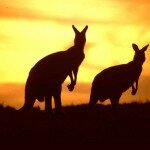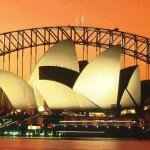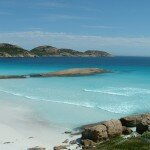Australia
February 14, 2008 – 10:25 pm
 Australia
Australia
Australia began its existence as an unknown continent in the Southern Hemisphere. The land was worked and lived on by indigenous tribes for approximately 46,000 years. No one knows much about those tribes because there is no recorded history and most of the knowledge about those tribes came about through the oral tradition. Anthropologists have pieced to together stories and fossils to confirm the long-term presence of the indigenous tribes.
The first recorded awareness of Australia came in the early 1600’s by Dutch exploring ships. Although ships did make ground in Australia, no settlements or long term contact was initially started. In the 1700’s the Dutch had claimed the land as their own and were calling it “New Holland”, however the conditions were not thought to be conducive for colonies and no new area was set up. In 1770 a British Navy Commander named James Cook landed on the eastern shore of the continent and began his explorations to the north, eventually taking the area in the name of the British Empire and calling it New South Wales.
Although it seems like a rough and rugged ground for families to colonize it worked as a perfect solution to one of the British Empire’s many problems. The colonies Britain had set up in American were supposed to eventually become penal colonies and quite a few British debt prisoners were sent the Americas to work off their penalty. With the loss of American in the Revolutionary War, Britain lost its main place to send criminals. This land seemed perfect for a penal colony and thus in 1787 they began to send ships full of prisoners to colonize Australia.
The first colony was completed on January 26, 1788 which is now considered Australia’s founding day. The next few decades would be spent by Britain exploring and colonizing the land first to the south and then to the north of the country. Two colonies in the Southern area were established as “free colonies” which meant you did not have to be part of the prison population to go there. These colonies became a haven for workers and trade merchants. In 1840 New Zealand was proclaimed a free colony as well.
Britain retained a very tight rein on its colonies, sending a continuous flow of prisoners to do the work and guards to keep the prisoners in line. After a prison sentence was finished there was no transportation back to England so most convicts became citizens of the Australian colonies. Working as masons, laborers and miners these men discovered there was gold in the land. The states of Australia were functioning with their own governments but were not recognized by the crown, and kept the secret of the gold for about 3 years to gain wealth hoping to get rights. When it didn’t work word of the gold was allowed to spread causing an Australian gold rush that would last for almost 10 years. In that time immigrants from England, America, China and Ireland all came to find their fortune on Australian soil. Instead of earning England’s respect, the opposite happened and Britain clamped down on the miners charging them high fees for equipment, lodging and licensing.



In 1854 a rebellion by the miners in Ballarat, protesting the high taxation and poor conditions, called the Eureka Stockade erupted drawing attention to the plight of the Australian people. In response to this Britain sent more soldiers and troops solidifying anger against the crown and calls for Australian states to find their rightful voice in Parliament. After a stand off a proliferation of soldiers ensued making a battle inevitable and in the process the military massacred the helpless group of miners with terrible carnage. This massacre was the pivotal event for change in history and after a court of inquiry held to the wrong doing of the army, new laws for miners, a standard fee instead of expensive licensing and the right to vote in parliament were gained in time. In 1901 Australia was officially made a commonwealth of the British Empire. It took almost 30 years for the government to form, a capital to be named and a constitution to be created. The Statute of Westminster in 1931 separated Australia from Britain’s constitution to give them the right to create their own legal terms and become full dominions. Australia resisted in signing the statute until World War II.
Australia was involved as an allied support in both World Wars sending troops and resources wherever battle was being done. The Gold rush had brought a fast prosperity to the land but the surface gold ran out quickly and soon the gold mines were also producing much less than could support the hundreds of miners who were trying to live off the land’s riches. An economic depression gripped the country and they were ill at ease to totally separate from Britain. However, Britain’s early defeats in the war and loss to the Japanese in 1942 caused the voters of Australia to sign the Statute of Westminster and turn to the United States of America as an ally and country to act in a protective way.
After the war, the economy began to rise because of the employability of so many soldiers and the war machine that raised the economy. However it became clear that Australia was too small in population to sustain the large continent financially for very long. The Australians sought to increase immigration by any means necessary and ended up creating a diverse multicultural environment to continue to produce economic and social prosperity.
A blighted mark on the history of Australia is its treatment of the Aboriginal and indigenous cultures. Aboriginal people were persecuted and sometimes killed for their unwillingness to assimilate into British or Australian culture. A program designed to take the children of aboriginal people and raise them the “proper way” failed miserably when the children were used as servants and slaves and many ran back to their own tribes or families as soon as possible. In the 1960’s Britain made some reparations to the aboriginal people and allowed them the right to vote and be a voice of their own.
Australia began as a wild frontier and over time and conquest became a shadow of the England and eventually a country of respect and a dominion of the British Empire.
Tags: Australia, Cities, Continents, Countries, Locations, States
4 Responses to “Australia”
I found your site on technorati and read a few of your other posts. Keep up the good work. I just added your RSS feed to my Google News Reader. Looking forward to reading more from you.
Tom Humes
By Tom Humes on Feb 14, 2008
I am Manjala Wijenayake Angammana from Galle, Sri Lanka. We are very famous in Sri Lanka. My mother is a very famous politication. We are very rich and famous. Now loving in Australia. Australia is a great nations with lots of good chaps. I love Australia. I love sports and bois.
By Manjala Wijenayake Angammana on Sep 14, 2011
I lives in Austria. I am an Australian but born in Galle, Fort Sri lanka. I miss my Galle and my Ex boi friend. My ex name is Malwenna. He is a very good musician. Specialy played Sri Lankan Baila. But ane meya now I am Australian. Almost forgot Sri Lankan style ane appe. Austraila is very great place meya, lots of opportunities ane. Good luck for all of you. I am Manjala Wijenayake Angamman. I was very famous in Sri Lanka.
By Manjala Wijenayake Angammana on Apr 14, 2012
I am Manjala Wijenayake Angammana ane. I do not look like an aborigine ane even they look me. Only we have very little little bit similar characteristics with Aborigines. I am very Australian, what a great article ane meya.
By Manjala Wijenayake Angammana on Apr 14, 2012